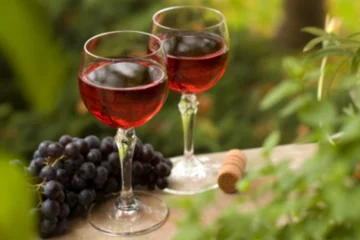Monday, Apr 13th, 2020
1. Hess Collection Cabernet Sauvignon Allomi Napa Valley
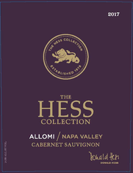
When much of Napa sees the summer fog, our Allomi Vineyard is often on the flip side, enjoying a bit of heat, which is just the thing for Cabernet Sauvignon.
Pope Valley is less well known than some notable Napa locations but the combination of steady heat and well drained clay loam soils allows fruit to ripen evenly, gaining welcomed complexity and layers of flavors.
Taste: Full bodied, with classic Cabernet red fruit flavors set off by aromas and flavors of currant and blackberry, our Allomi Cab is noted for moderate, well-integrated tannins showing a round, plush mouthfeel. Distinct notes of vanilla and oak spice from aging in American oak add to the personality of the wine, surely one of our most popular Napa offerings.
Kevin’s Notes: I first sold Hess wines around 1990 as a sales rep. It takes a great deal work to launch a new winery, but Donald Hess is a brilliant man. He made his fortune in bottled water in Scandinavia and used its funds later to start
Hess Collection Winery. The winery holds the world’s largest permanent modern art collection open to the publc, ths the name Hess “Collection”.
Regular $36.99 Now $32.99
2. Château de Saint Cosme, Little James Basket Press White
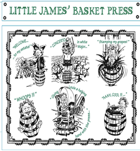
In the heart of the appellation Gigondas, the Château de Saint Cosme is an exceptional estate, with its Gallo-Roman fermentation vats perfectly preserved. This fantastic historical site gives a good idea how our ancestors the Gallo-Romans were living. The property has been in our family since 1490 and we have been vignerons for 14 generations.
The Wine: An unconventional blend of Sauvignon Blanc and Viognier take center stage in the St. Cosme Little James Basket Press White; a wine reminiscent of a warm summer nights. This aromatic white combines the freshness and acidity of Sauvignon Blanc with the flesh and depth of Viognier, creating a rare wine worthy of the masses.
Kevin’s Notes – Last year, we sold almost 25 cases of this wine due to it’s wonderful layers of aroma and taste. It so tantilizing with amazing honey suckle aromatics and bright citrus fruit.
Regular $16.99 Now $14.99
3. Kevin Descombes, Beaujolais Cuvée Kéké
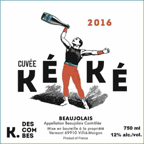
A the ripe old age of 21, Kewin produced his first vintage in 2013. He currently rents 1.15 hectares (3 acres) within the Beaujolais appellation along with 1.6 hectares (4 acres) of Morgon vineyards from a retired vigneron who’d previously rented the vines to his father Georges, whom we also import.
In addition, Kewin purchased 1.2 hectares of 85 year old Morgon vines in 2013, which produce his Vieilles Vignes. The Wine: Grown from Kewin Descombes’ 50+ year-old vines in and around Morgon. Working in his father’s winery, alongside Dad and stepbrother Damien Coquelet, Kewin works entirely organically in both the vineyard and winery. The Cuvée Kéké is all old-vine Gamay, fermented on indigenous yeast, with a partial carbonic maceration. Aged in neutral oak for 5-6 months before bottling without filtration or fining.
Kevin’s Notes – What does “Old Vines” mean and why is it important. There is no “legal age” requirement for a vine to be called old vines, but the general accepted rule is 50 yrs. It’s important to know because they produce less fuit, and the fruit is most often more intense. The wines can be more complex because the root system maybe +50ft deep!
These vines are 85 years old!!! Regular $26.99 Now $22.99
4. Immich-Batterieberg C.A.I. Riesling Trocken
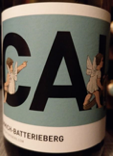
Immich-Batterieberg ranks among the oldest estates on the Mosel. The middle portion of the estate’s grounds – still standing today – was first mentioned, in 908 A.D., by Ludwig IV, the last East Frankish Carolingian king, in a deed that confirmed the estate’s transfer to the church.
According to archaeological estimates, the foundation of the building dates from the second half of the 9th century. Especially remarkable is the cellar’s load-bearing basalt pillar, which was “recycled’ from a nearby Roman estate.
It was the Immich family – among the oldest winemaking families on the Mosel, with a history that spans from 1425 through 1989 – that was especially crucial to the history and the development of the estate. We have them to thank for our most famous site, the Batterieberg, which between 1841 and 1845 was formed into one of the Mosel’s top sites by way of ceaseless rounds of dynamite.
Batterieberg, along with the older top-tier sites Steffensberg, Ellergrub, and Zeppwingert, are all steep slate slopes and all achieved the highest ranking in the Prussian Vineyard Classification of 1868. Today they comprise the heart of the estate.
Wine Education: Trocken = dry wine
Kevin’s Notes: Riesling is considered as one of the world’s “Noble Grapes” and as you read, this wine is considered “nobility”. Its nose is stunning and bright with minerality and fresh picked pears. The wine is dry with brilliant acidity and racy flavors of apple and pear – it’s very special! Great with Asian and Indian food. Perfect with pork and any roasted fowl.
Regular $22.99 Now $19.99
5. Camina Tempranillo
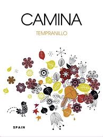
Camina, a label under Bodegas Cristo de la Vega, is located in the heart of the La Mancha appellation, in the small village of Socuellamos. Bodegas Cristo de la Vega was founded in 1955 by 25 vine growers. Over the last decade, the winery has invested heavily in high-tech equipment to precisely control every step of the winemaking process from harvest to bottling to ensure quality vintage after vintage
Winemaker Notes: With a cherry-red robe, this wine features a bouquet of raspberries, blackberries and cherry. On the palate the red fruit continues with notes of almond, hazelnuts and a touch of vanilla on a round body. Perfect for all types of pastas, poultry, rice dishes and meats.
Now $11.99
6. Maison Ferand Mathilde Peche Liqueur

Mathilde fruit liqueurs are handcrafted French spirits produced from our cherished forefathers’ recipes. Today, Maison Ferrand painstakingly oversees the production of Mathilde liqueurs and strives to transmit its ancestral savoir-faire, year after year.
The farmers who grow the fruits for Mathilde are guided by traditional farming techniques and harvest only the freshest fruits at their peak ripeness to ensure we capture the most palatable flavors.
The result is a fancy liqueur from France, wonderfully adaptable for mixing in cocktails, using in baking and cooking like our grandmothers did, drizzling on fruits and desserts, mixing with soda water and so many more variations.
The vine peaches used for Mathilde Pêche are small, with a tough skin and moderately soft, white flesh with a particularly rich aroma. They are considered to be the most flavorful peach variety. Vine peaches are incredibly juicy, despite their small size, with an intense and seductive taste. We only use vine peaches cultivated in France that are hand selected to ensure their freshness.
The peaches – skin, flesh and pit – are macerated in alcohol. The entire peach is used to extract as much of its taste and aroma as possible. A small amount of sugar is incorporated and water is added to bring the liqueur to proof and round out the liqueur’s distinctly pleasing palate. Kevin’s Notes: “OMG” Margharita
Cooper’s Price $15.99 375ml
